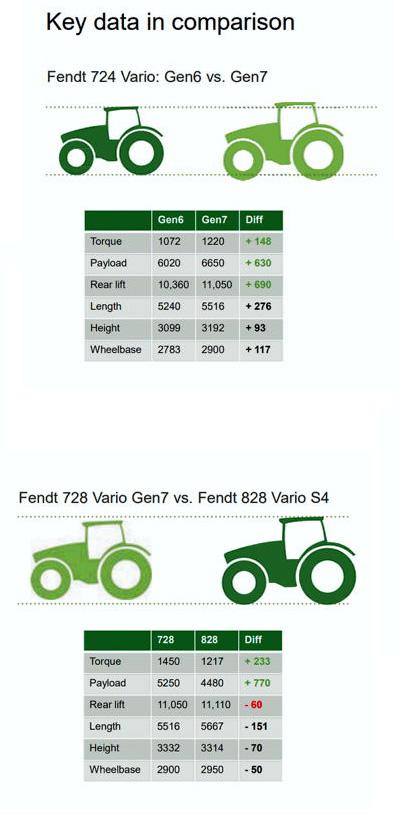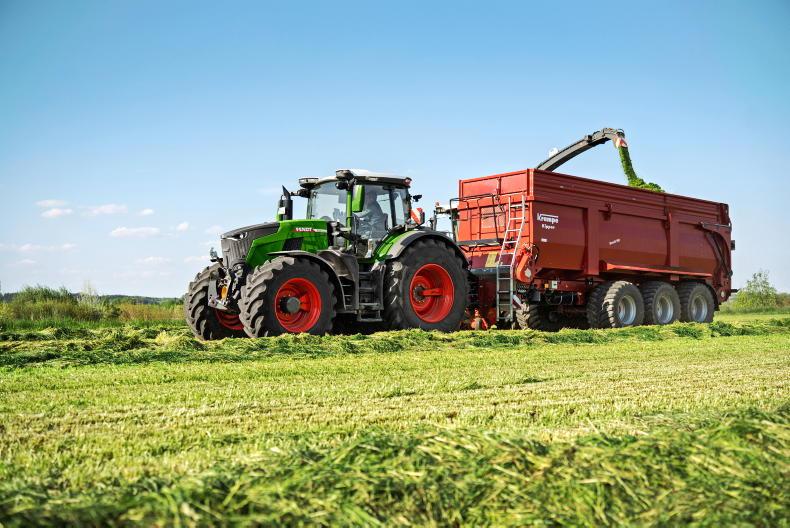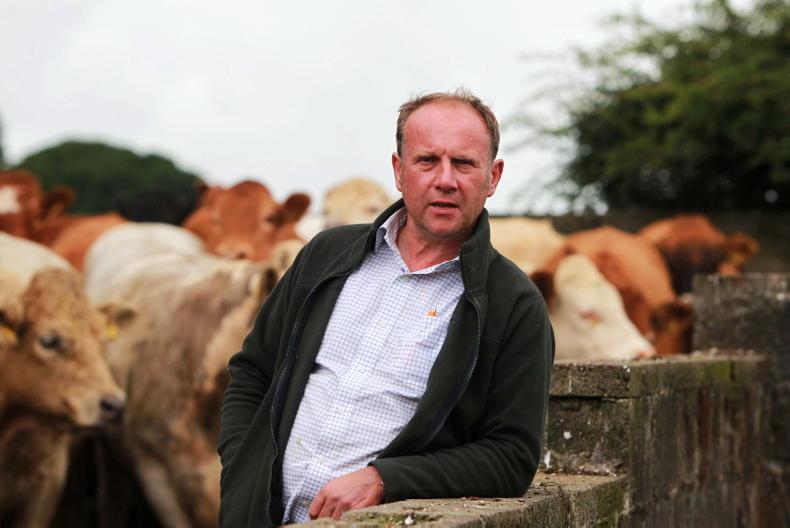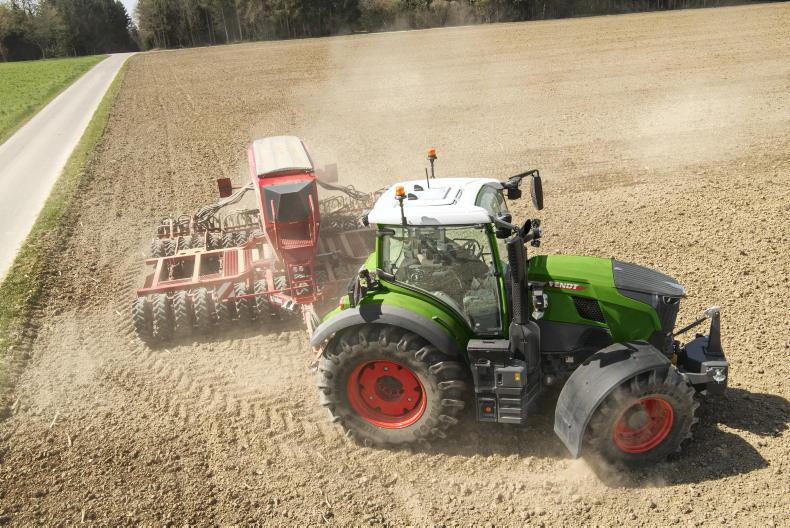In August, Fendt revamped its popular 700 series tractor range, adding two models (726 and 728 Vario) and announcing the discontinuation of the existing 800 series. The very first of the new flagship 728 Varios touched down in Dublin last week.
The new 700 series breaks the 300hp barrier for the first time, with the 728 replacing the 724 as the flagship tractor. The revamp from the German manufacturer comes in response to market demand for a higher power to weight ratio in a compact frame. The existing 800 series will be available to order up to May, and will be phased out of production later this year.
The seventh generation comes just three years after the arrival of the Gen 6. The five-model range features the 720, 722, 724, 726 and 728 (all Vario) and has a rated power of 203hp to 283hp.

When needed, the tractors benefit from a further 20hp, thanks to the Dynamic Performance (DP) automatic power boost concept. Once active, the flagship 728 Vario churns out over 300hp. The new boost is now engaged whenever required, even at static PTO applications, and is thus not forward speed related.
New engine
The new generation sees Fendt move away from the existing Deutz engines to a new 7.5l AGCO Power engine. The manufacturer says this engine has been developed specifically for the Gen 7 Fendt 700 Vario.
Known as the Core 75, representatives explained that it is compatible with future fuels such as hydrogen, ethanol, methanol, biogas, and could potentially operate as an electric hybrid with further development. The engine has been in development for the past eight years.
The firm has also introduced the Fendt iD low-speed concept for the first time in the 700 series. Previously used in the larger 900 and 1000 series, this allows the highest torque to be achieved at low engine speeds. The rated engine speed is only 1,700 rpm for low fuel consumption.
On the road, the two larger models reach a top speed of 60km/h at 1,450rpm, 50km/h at 1,200rpm and 40km/h at 950rpm. Meanwhile, the 728 Vario achieves maximum torque of 1,450Nm at 1,300rpm. The 728 Vario offers a power to weight ratio of 30.5kg/hp. 
The fan on the new cooling system is now mounted in front of the radiator pack, and works by pushing the air through the cooling pack, rather than pulling it through.
Automatic 4WD
The 700 series now also benefits from Fendt VarioDrive, which offers stepless, dynamic driving at any speed from 0.02 to 60km/h. The VarioDrive powertrain could be described as the next step in progression from a Vario transmission. With this concept, the front and rear axles are driven separately, with the torque distributed dynamically, depending on where the power is needed.

The cab is the only shared component from the existing Gen 6, 700 series.
This is controlled via an all-wheel drive clutch. It means manual control of the four-wheel drive system is no longer necessary. Instead, it is engaged automatically. In fact, the operator now can’t even engage four-wheel drive manually, as the button has been removed.

Turning radius on 700 Gen 6, Gen 7, and 800 series compared.
When taking corners or turning on headlands, the tractor is pulled around the curve by the VarioDrive’s pull-in turn effect, rather than being pushed around the corner. This pulling effect comes from the front wheels driving faster than the rear wheels. Fendt says this leads to a 10% smaller turning circle. This means the turning circle of the 728 is shorter than the existing 724. Unlike the Vario transmission in the previous 700 series, there is no range change on the VarioDrive powertrain– it’s one continuous range. Once the tractor passes 25km/h, only the rear wheel motor is active.
A hydraulic pump capacity of up to 220l/min with up to five rear remote valves, two front and three in the middle are available. A new draft control for the rear linkage shifts the weight of the implement proportionally to the rear axle of the tractor, to increase traction.
The cab is the only shared component from the existing Gen 6, 700 series.
Cooling system
Fendt has adapted the Concentric Air System (CAS) ventilation and cooling concept from the larger tractor ranges to the new 700 Vario tractors.
Powered by its own hydraulic motor, it’s now decoupled from the engine speed to provide more flexible cooling, depending on demand. The fan is now mounted in front of the radiator pack, and works by pushing the air through the cooling pack, rather than pulling it through.

The fan on the new cooling system is now mounted in front of the radiator pack, and works by pushing the air through the cooling pack, rather than pulling it through.
Fendt says this means the fan speed can be reduced, adding that it requires up to 40% less power compared to a conventional fan.
The repositioning of the new 56cm fan results in a slim bonnet design, allowing for a greater steering angle of 52°, which contributes to the tighter turning circle. The unit can be specified with the optional reversible fan function.
Cab
The cab is the only shared component from the existing Gen 6, 700 series. This features the much welcomed and revamped FendtOne control layout, which was introduced two years ago.
This provides operators with the option of working the tractor via the multifunction joystick or the 3L joystick.

The FendtOne concept provides operators with the option of working the tractor via the multifunction joystick or the 3L joystick option.
The 700 Vario is equipped with a 10in digital dashboard and a 12in terminal on the armrest as standard, while an additional 12in terminal in the headliner is available. It comes with six different seat configurations to choose from, including a new premium leather seat with comfort functions and intuitive operation via the terminal. Personalised profiles can now be saved for each driver.

Optional safety cameras are available for the front and rear of the tractor.
For the first time, the cab air filtration system can optionally come with category 4 protection according to EU standards (EN15695). Category 4 rating is the same as what comes in self-propelled sprayers, designed to protect the driver from dust and vapour from sprays etc.
Other cab updates include a window wiper on the right-hand cab window, two optional cameras for the front and rear, two optional work lights built into the bonnet and LED taillights with dynamic automotive style indicators. The air conditioning system has also been improved.
Other features
For the first time, the 700 series comes with the option of Fendt’s fully integrated VarioGrip central tyre inflation system. As covered in detail in our tyre focus last week, this allows operators to adjust tyre pressure from the tractor’s control terminal while on the move.

The front links now feature a load relief effect which is adjustable thanks to pressure relief valve.
Tractors in the range are available with the optional new trailer brake assistant. This uses a sensor to measure the thrust torque of the trailer through the transmission. If the tractor detects that the trailer is pushing too hard, the trailer’s pneumatic brakes are automatically activated.

It also comes with the option of the Cargo Pro 6100 redeveloped front-end loader, which offers a maximum lift capacity of 4,150kg and a maximum lift height of 4.85m. It features its own valve block with three separate valves, meaning it has no shared lines.
Several sold in Ireland
The new Gen 7 models will continue to run alongside the current Gen 6, 700 Vario range. This is because the AGCO Power engines have only been introduced from the 720 Vario upwards, meaning the smaller 714, 716 and 718 Vario tractors will all remain Gen 6 and Deutz powered.

Fendt have confirmed to the Irish Farmers Journal that they have deals done in Ireland for several new 728’s, which are expected to arrive from June.
An extended warranty offering coverage for eight years or 8,000 hours can be purchased, which Fendt claims is the longest coverage on the tractor market, which are expected to arrive from June.
The manufacturer is quoting a list price for the entry level 700 series at €318,500 plus VAT, but it’s expected the selling price of the 728 will be marginally under a staggering €300,000 plus VAT.
In August, Fendt revamped its popular 700 series tractor range, adding two models (726 and 728 Vario) and announcing the discontinuation of the existing 800 series. The very first of the new flagship 728 Varios touched down in Dublin last week.
The new 700 series breaks the 300hp barrier for the first time, with the 728 replacing the 724 as the flagship tractor. The revamp from the German manufacturer comes in response to market demand for a higher power to weight ratio in a compact frame. The existing 800 series will be available to order up to May, and will be phased out of production later this year.
The seventh generation comes just three years after the arrival of the Gen 6. The five-model range features the 720, 722, 724, 726 and 728 (all Vario) and has a rated power of 203hp to 283hp.

When needed, the tractors benefit from a further 20hp, thanks to the Dynamic Performance (DP) automatic power boost concept. Once active, the flagship 728 Vario churns out over 300hp. The new boost is now engaged whenever required, even at static PTO applications, and is thus not forward speed related.
New engine
The new generation sees Fendt move away from the existing Deutz engines to a new 7.5l AGCO Power engine. The manufacturer says this engine has been developed specifically for the Gen 7 Fendt 700 Vario.
Known as the Core 75, representatives explained that it is compatible with future fuels such as hydrogen, ethanol, methanol, biogas, and could potentially operate as an electric hybrid with further development. The engine has been in development for the past eight years.
The firm has also introduced the Fendt iD low-speed concept for the first time in the 700 series. Previously used in the larger 900 and 1000 series, this allows the highest torque to be achieved at low engine speeds. The rated engine speed is only 1,700 rpm for low fuel consumption.
On the road, the two larger models reach a top speed of 60km/h at 1,450rpm, 50km/h at 1,200rpm and 40km/h at 950rpm. Meanwhile, the 728 Vario achieves maximum torque of 1,450Nm at 1,300rpm. The 728 Vario offers a power to weight ratio of 30.5kg/hp. 
The fan on the new cooling system is now mounted in front of the radiator pack, and works by pushing the air through the cooling pack, rather than pulling it through.
Automatic 4WD
The 700 series now also benefits from Fendt VarioDrive, which offers stepless, dynamic driving at any speed from 0.02 to 60km/h. The VarioDrive powertrain could be described as the next step in progression from a Vario transmission. With this concept, the front and rear axles are driven separately, with the torque distributed dynamically, depending on where the power is needed.

The cab is the only shared component from the existing Gen 6, 700 series.
This is controlled via an all-wheel drive clutch. It means manual control of the four-wheel drive system is no longer necessary. Instead, it is engaged automatically. In fact, the operator now can’t even engage four-wheel drive manually, as the button has been removed.

Turning radius on 700 Gen 6, Gen 7, and 800 series compared.
When taking corners or turning on headlands, the tractor is pulled around the curve by the VarioDrive’s pull-in turn effect, rather than being pushed around the corner. This pulling effect comes from the front wheels driving faster than the rear wheels. Fendt says this leads to a 10% smaller turning circle. This means the turning circle of the 728 is shorter than the existing 724. Unlike the Vario transmission in the previous 700 series, there is no range change on the VarioDrive powertrain– it’s one continuous range. Once the tractor passes 25km/h, only the rear wheel motor is active.
A hydraulic pump capacity of up to 220l/min with up to five rear remote valves, two front and three in the middle are available. A new draft control for the rear linkage shifts the weight of the implement proportionally to the rear axle of the tractor, to increase traction.
The cab is the only shared component from the existing Gen 6, 700 series.
Cooling system
Fendt has adapted the Concentric Air System (CAS) ventilation and cooling concept from the larger tractor ranges to the new 700 Vario tractors.
Powered by its own hydraulic motor, it’s now decoupled from the engine speed to provide more flexible cooling, depending on demand. The fan is now mounted in front of the radiator pack, and works by pushing the air through the cooling pack, rather than pulling it through.

The fan on the new cooling system is now mounted in front of the radiator pack, and works by pushing the air through the cooling pack, rather than pulling it through.
Fendt says this means the fan speed can be reduced, adding that it requires up to 40% less power compared to a conventional fan.
The repositioning of the new 56cm fan results in a slim bonnet design, allowing for a greater steering angle of 52°, which contributes to the tighter turning circle. The unit can be specified with the optional reversible fan function.
Cab
The cab is the only shared component from the existing Gen 6, 700 series. This features the much welcomed and revamped FendtOne control layout, which was introduced two years ago.
This provides operators with the option of working the tractor via the multifunction joystick or the 3L joystick.

The FendtOne concept provides operators with the option of working the tractor via the multifunction joystick or the 3L joystick option.
The 700 Vario is equipped with a 10in digital dashboard and a 12in terminal on the armrest as standard, while an additional 12in terminal in the headliner is available. It comes with six different seat configurations to choose from, including a new premium leather seat with comfort functions and intuitive operation via the terminal. Personalised profiles can now be saved for each driver.

Optional safety cameras are available for the front and rear of the tractor.
For the first time, the cab air filtration system can optionally come with category 4 protection according to EU standards (EN15695). Category 4 rating is the same as what comes in self-propelled sprayers, designed to protect the driver from dust and vapour from sprays etc.
Other cab updates include a window wiper on the right-hand cab window, two optional cameras for the front and rear, two optional work lights built into the bonnet and LED taillights with dynamic automotive style indicators. The air conditioning system has also been improved.
Other features
For the first time, the 700 series comes with the option of Fendt’s fully integrated VarioGrip central tyre inflation system. As covered in detail in our tyre focus last week, this allows operators to adjust tyre pressure from the tractor’s control terminal while on the move.

The front links now feature a load relief effect which is adjustable thanks to pressure relief valve.
Tractors in the range are available with the optional new trailer brake assistant. This uses a sensor to measure the thrust torque of the trailer through the transmission. If the tractor detects that the trailer is pushing too hard, the trailer’s pneumatic brakes are automatically activated.

It also comes with the option of the Cargo Pro 6100 redeveloped front-end loader, which offers a maximum lift capacity of 4,150kg and a maximum lift height of 4.85m. It features its own valve block with three separate valves, meaning it has no shared lines.
Several sold in Ireland
The new Gen 7 models will continue to run alongside the current Gen 6, 700 Vario range. This is because the AGCO Power engines have only been introduced from the 720 Vario upwards, meaning the smaller 714, 716 and 718 Vario tractors will all remain Gen 6 and Deutz powered.

Fendt have confirmed to the Irish Farmers Journal that they have deals done in Ireland for several new 728’s, which are expected to arrive from June.
An extended warranty offering coverage for eight years or 8,000 hours can be purchased, which Fendt claims is the longest coverage on the tractor market, which are expected to arrive from June.
The manufacturer is quoting a list price for the entry level 700 series at €318,500 plus VAT, but it’s expected the selling price of the 728 will be marginally under a staggering €300,000 plus VAT.





















SHARING OPTIONS